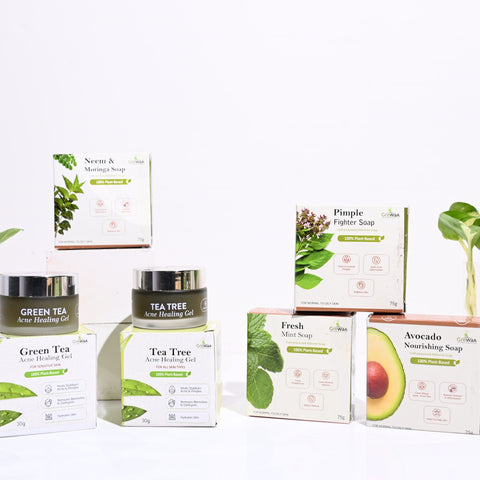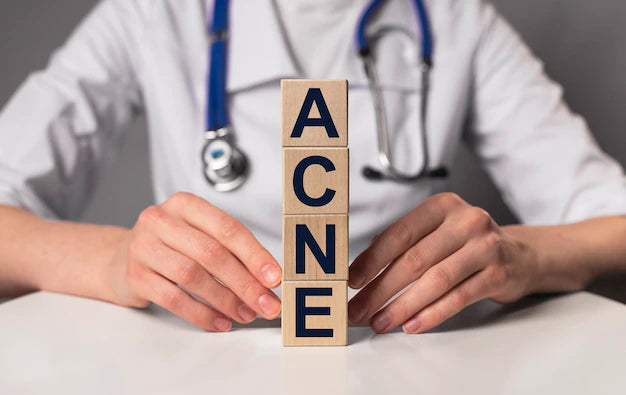Acne is a very common skin condition that affects most individuals at some point of time in their life. Acne occurs because of the blockage of pores. The pores are blocked by hair, sebum or even dead cells and bacteria. This blockage results in the development of pimples. There are various types of acne, let us get to know them all.
- Blackheads
- Whiteheads
- Pustule
- Papules
- Fungal acne
- Nodules
- Cyst
Blackheads

These are small easily seen bumps on the surface of the skin. It occurs due to the clogging of the hair follicle. The name has a valid meaning because blackheads are typically black or dark in colour. We can consider blackheads as a mild type of acne. The most common place where blackheads are found is on the face, but it is also seen on the
- Shoulders
- Neck
- Chest
- Arms
- Back
The blackheads start as bumps or comedo which is caused due to blockage. But this bump gets opened up. This will expose them to air which causes the black colour of the black head. They are typically painless projections that can be treated easily.
Whiteheads

This most commonly occurs on the T zone on your face, that is the nose and forehead. This is because of the excess oil production in this area. But it doesn't mean that whiteheads can't occur in any other area as similar to blackheads they can occur on the neck, chest, arms and back too. They occur due to the blockage of pores with dead cells, bacteria and oil. Typically the pores get clogged and raise as a whitehead. There are many reasons for whiteheads the most common one is hormonal changes, hence puberty, menopause or pregnancy can trigger whiteheads. The white head is also a mild form of acne that can be easily treated. The difference between blackheads and whiteheads is that the white head doesn't open up and is closed hence there is no colour change.
Papule

A papule is an inflammatory type of acne while blackheads and whiteheads are non-inflammatory types of acne. They appear as tiny red bumps on the surface of the skin. They are small in size usually around 5mm in diameter. The centre is not filled with pus. The blockage of pores due to oil and dead cells is called a comedo. The oil in this is food for bacteria. The common bacteria that causes acne is Propionibacterium acnes (P.acnes) and it starts to live there. When this ruptures and the contents are spilt in the skin tissue, it results in inflammation called Papule.
Pustule

These are bumps on the skin that is filled with fluid or pus. They look like white bumps but are surrounded by inflamed red skin. This is also an inflammatory type of acne. They have the potential to grow very big. They can also form clusters in the same area. These can be caused due to an imbalance in hormones. They can develop in any part of the body but it is commonly seen on the face, back and chest. It is a common condition among young adults and teenagers. Pustules usually are filled with pus. They can become very hard and painful.
Fungal Acne

Fungal acne - the name itself is a misnomer as acne means it is typically caused by bacteria. But this acne is caused by a fungal infection. Normally on our skin, there is a balance between organisms. But if there is an imbalance, then fungal infections can occur. Mostly yeast causes such infection. It appears as small pimples that are almost similar in shape or size. Itching is commonly associated with fungal acne. Fungal acne is also known to cause skin irritation. Sometimes fungal acne can also result in whiteheads. Usually, it won’t respond to over-the-counter pimple cream.
Nodular Acne

Nodular acne or acne nodule will look like a small bump under the skin. It can be even the same colour as your skin or it can become red because of the inflammation surrounding the area. The typical feature to distinguish it from pimples is the absence of a head. Nodular acne is generally painful to touch. Just like any other acne this also arises because of clogged pores. Bacteria P.acnus may be found in the pores. Nodular acne can go deep into the skin and is considered a more serious type of acne.
Cyst

Cyst acne is one of the most severe forms of acne. It develops from deep within the skin, unlike other acne which is found on the surface of the skin. It is also very large and is considered the largest acne. It may typically look like a boil on the surface of the skin. Other features of cystic acne are
- They appear as a large white bump
- Redness
- Tender to touch
- Pus filled
- It is common in the face, neck, arms and chest.
- Can be seen behind the ears too.
Any Type Of Acne Can Be Cured
As you can see all types of acne are a result of clogged pores. And, clogged pores can result due to various reasons including hormonal fluctuations which cause excess sebum production and even genetic predisposition to acne. Whatever the reason might be acne can be prevented and cured with the right products. And, you can find the right products for acne-free skin in Grewaa.

As the name suggests, Grewaa stands for Green Warriors Against Acne. We have the best natural anti-acne solution formulated from long research of ancient and traditional skin care methods to find the potential acne-fighting herbs tested by science.
We have crafted anti-acne products based on every skin type and kept them for you here.
Let's fight against Acne!!!


